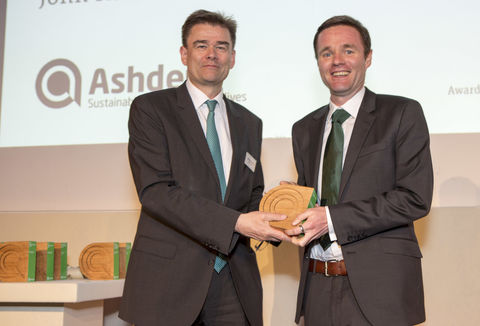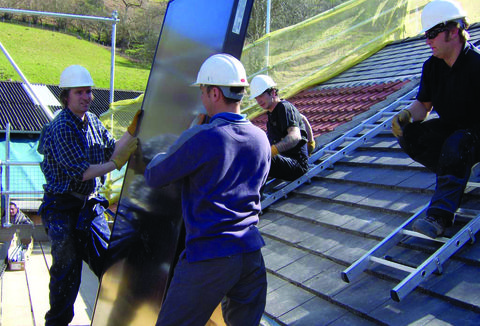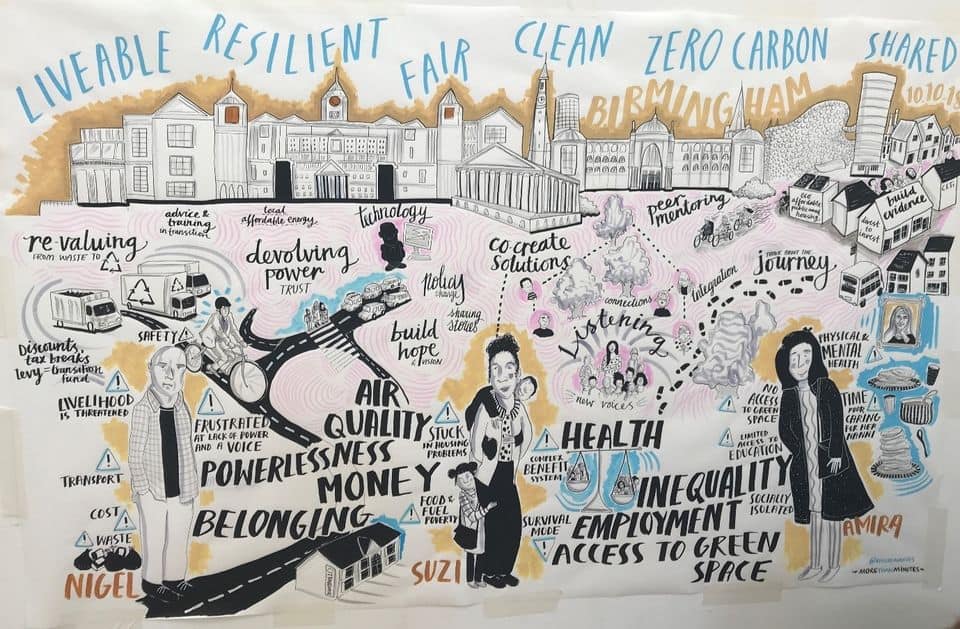These are the words of Kerry Kennedy, the human rights campaigner and daughter of Robert F Kennedy, speaking at an event recently. But what does it mean to have an economy that works for everyone?
At Ashden we know that social, economic and environmental issues can be tackled together to create liveable, equitable, sustainable and resilient cities. It is what our winners do all the time. But we are not sure that those making critical decisions in our cities understand this. That’s why, like our partners and friends at The Grantham Institute, we are working to demonstrate the co-benefits of tackling climate change. How, by realising the vision of zero carbon cities, we can improve the lives of citizens in other ways as well.
But how can you bring these co-benefits to life? We decided to experiment. Working in the West Midlands we hosted an event, in Birmingham, facilitated by the award-winning playwright and activist Sarah Woods.
Working with communities in Birmingham Sarah developed three characters based on the lives of real people, their concerns and the challenges that climate change impacts create for them. We then brought in actors to bring these stories to life for participants at our event, enabling us to interact with and ask questions of them.
Our participants were a diverse range of people from city regions and local authority administrations, the NHS, community groups, academics, Ashden award winners and policy organisations.

Ashden Award for Reducing Fuel Poverty
SHINE
Read more
Through listening, questioning and conversing we asked them to identify the issues that were affecting these citizens lives, explore how climate solutions might help improve their situations and start to think about how these solutions may be deployed locally.
Who we met
The results were interesting, with the characters bringing to the surface the ways in which real people with complex lives experience and react to issues like air pollution and fuel poverty. Issues that we’re more accustomed to talking about in the abstract, even as we try to find solutions.
Conversation with the characters identified all sorts of issues and potential ways forward. For Suzi, a single mum in temporary accommodation at a motorway service station, the main ‘trigger’ issue was fuel poverty. She faced the stark choice of ‘heat or eat’ before ultimately losing her home due to rising bills. Like many around the country, she and her children were suffering the health effects of polluted air. And their temporary accommodation leaves them isolated and disconnected from family and community.
For Nigel, running a successful skip hire business in the city centre, he sees policy to tackle air pollution as a threat to his livelihood. And an unfair one at that, given that they were encouraged to buy diesel vehicles, which are now vilified. In talking through his situation, it became apparent that the real challenge was the clear gulf between solutions developed in city hall and engagement with the people that will be affected by them. He felt isolated, with change being ‘done to him’, rather than listened to, with the chance to explore how his business could be part of a cleaner future for the city.
Amira is a young girl with caring responsibilities, as well as health issues due to poor air quality, which are combining to leave her cut off from opportunities and at risk of mental health issues. She is struggling to see an optimistic future and, like the other characters, are affected by dirty air that may also be contributing to her Grandmother’s dementia.

So, what did we learn?
The connection between the issues our characters face and climate change often seem distant, if not invisible. But it was clear that a changing climate is exacerbating their situations, and solutions to climate change, if well considered, can relieve them. To bridge the gap, a clear priority was the need to ‘take people with you’, so that they feel involved and part of a solution rather than things being done to them.
For example, Nigel’s clear expertise in waste issues could inform Birmingham’s work to develop a circular economy. Engaging SMEs in city decision making was widely thought of a as a good idea. And perhaps the money raised from air quality measures could be ring-fenced and used as a transition fund, creating a link between cost and the benefits?
Housing and the spaces around it also came out as central. Clean air, access to green space and to warm, affordable homes, would alleviate challenges for many of our characters – reducing respiratory illness, helping avoid fuel poverty, and providing clean, green spaces for all ages to enjoy, along with the associated mental health benefits. Situations like Suzi’s, where she lives on the M5, shouldn’t be possible in a modern city. With estates falling into disrepair around Birmingham, the systemic barriers to innovative, sustainable redevelopment that involves communities was a clear frustration and a no-brainer as a solution.
Sustainable transport came up time and time again not just in terms of reducing emissions and pollution but in terms of the role it can play in connecting people and places and in improving health. Cycling schemes, like the successful Big Birmingham Bikes has allowed diverse communities to discover the pleasure of cycling and to access jobs and services more easily. Some of their early adopters have now become advocates in their own communities increasing levels of engagement and citizenship. It seems an obvious solution for Nigel’s son who “spends too much time in his room killing aliens”, and for Amira, whose navigation of the bus network takes too long and leaves her exhausted and discouraged from trying to see her friends and access education.

Ashden UK Award
Centre for Alternative Technology (CAT)
Read more
A new way of looking at the problem
Finding solutions based on real life experience allows what Paul Allen at the Centre for Alternative Technology calls ‘multi-solving’. Policies and strategies that are devised and implemented with improving lives in mind can also allow us to tackle the challenge of decarbonising our cities, taking the people that live in them with us by improving their lives and enabling them to feel part of the solution.
What it also means is that we can find funding from more unusual routes. Funding housing retrofits from health budgets would save the NHS millions in dealing with the ‘revolving door’ issues of respiratory illness. Implementing Local Industrial Strategies that provide resilient infrastructure for the future whilst creating good quality jobs would demonstrate local benefit. Making sure that economic development plans are providing the skills that will be required for this transition makes good sense.
As Kerry Kennedy said, we need moral imagination and leadership. By working with Metro Mayors and their teams, we at Ashden hope to aid policy makers to see the co-benefits of tackling climate change. By realising these benefits, we will achieve low carbon cities that are not just resilient but equitable, collaborative and liveable too.
For other views on this event see what some of our guests thought.

